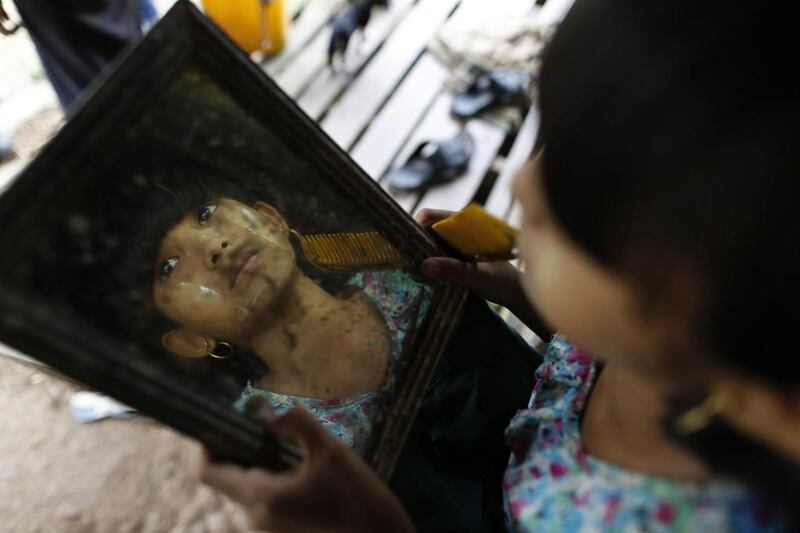THANDWE, Myanmar // Terrified Muslim families hid in forests in western Myanmar yesterday, a day after fleeing new sectarian violence that erupted even as the president toured the divided region.
Buddhist mobs killed a 94-year-old woman and four other Muslims and burned dozens of homes on Tuesday near the coastal town of Thandwe.
The government has failed to stop the sectarian violence from spreading since it first erupted last year, killing hundreds of people and forcing many thousands to flee their homes.
Some rights groups accuse the government of tolerating, or even abetting, what they describe as ethnic cleansing directed against the Muslim Rohingya minority in Myanmar.
They say President Thein Sein, who is visiting the region for the first time since clashes flared there last year, has done little to crack down on religious intolerance and failed to bridge a divide that has left hundreds of thousands of Muslims marginalised and segregated — many of them confined by security forces in inadequately equipped camps for those who fled their homes.
The president arrived in Thandwe yesterday, the second day of his visit to Rakhine state, and was to meet religious leaders from both communities.
Critics say his security forces have not done enough to contain the violence, and that his government has failed to crack down on radical Buddhist monks who have instilled hatred and fear of the Muslim minority, arguing they pose a threat to Buddhist culture and traditions.
In a message to religious leaders that ran in Myanmar’s state-run newspapers yesterday, Thein Sein said the sectarian unrest threatens the government’s reform process “and tarnishes the national image internationally.”
State television broadcast a statement last night from the president expressing sadness over the violence and saying the government would pursue justice. It did not say how many people were injured or killed.
“It’s just a political game,” said Hla Sein, a 54-year-old Muslim man speaking at a house in Thandwe.
“The president is the most responsible person in the country. Up until now, when Muslim people have been killed, their property destroyed, he’s been silent,” he said, as six men sitting with him nodded in agreement.
In Thabyuchaing, about 20km north of Thandwe, more than 700 rioters, some swinging swords, took to the streets, police officer Kyaw Naing said. A 94-year-old Muslim woman died from stab wounds in the clashes that followed, the officer said, adding that between 70 and 80 houses were set on fire. A Muslim resident of Thandwe, Myo Min, said he was concerned about the safety of families who fled Tuesday’s violence. He said many families in Thabyuchaing fled into forests when their village was attacked.
“Many of them, including women and children, are still hiding, and they are cornered and unable to come out,” Myo Min said. “They need food and water, and Muslim elders are discussing with authorities to evacuate them or send food.”
*Associated Press





